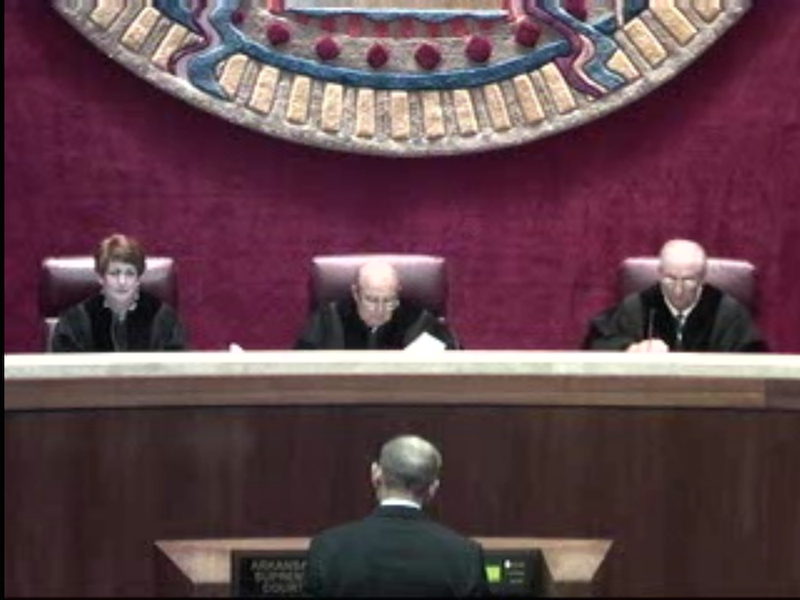The Arkansas Supreme Court has begun hearing arguments in an appeal of a judge's ruling that allowed gay marriage in Arkansas earlier this year.
Justices began hearing oral arguments at 9 a.m. in the case, which stems from Pulaski County Circuit Judge Chris Piazza's ruling that found Arkansas' ban on same-sex marriages unconstitutional. Several places in Arkansas, including Pulaski County, offered marriage licenses to gay couples for a time before the high court stayed the ruling pending its appeal.
The hearing began with Assistant Attorney General Colin Jorgensen asking the justices to reject Piazza's ruling and side instead with the 2004 amendment Arkansas voters passed defining marriage as being between one man and one woman.
He said the court "should defer to the democratic process and defer to the voters of Arkansas."
"This is a case about change, and it's a case about who decides whether and when and how to effectuate change: Seven justices of the Arkansas Supreme Court or over 700,000 voters of Arkansas. The citizens of Arkansas have a legitimate interest, indeed a fundamental right, to define marriage through the democratic process."
Jack Wagoner, an attorney representing opponents of Arkansas' gay-marriage ban, told the justices the vast majority of cases across the country has come down on the side of allowing same-sex unions.
He called the law a "blanket ban on the right to marry" that should get "strict scrutiny under the U.S. Constitution."
"It's virtually almost unanimous that the appellees' position in this case is correct," he said. "This is happening … It's happening whether this court doesn't let it happen right here now or not."
Justice Courtney Goodson asked if allowing same-sex marriage could open the door for allowing polygamy or bigamy. Wagoner argued it did not, saying those circumstances would require sweeping societal changes while gay unions do not.
"We can plug this right into the whole societal structure and nothing has to be changed," he said. "… But you try to plug in different spouses and it doesn't fit within the existing framework."
Jorgensen argued that the state's voter-approved ban is not a violation of the U.S. Constitution, noting that same-sex marriage has not been recognized as a fundamental constitutional right and gay couples do not constitute a "suspect class" afforded rights under equal protection standards.
"We have neither of those here," he said.
He asked the justices not to take into account any argument against the ban under Arkansas' constitution, saying it can't violate it since it's part of the constitution as an amendment.
"The Arkansas claims are barred as a matter of law. Period," he said. "There should be no analysis. It should be one sentence in your opinion."
Cheryl Maples, another attorney speaking on behalf of opponents of the ban, disagreed, saying the state constitution cannot be amended to remove rights guaranteed under it.
"The idea that a majority of voters can go to the polls and change one of our bills of rights, one of our fundamental rights, it just boggles the mind," she said. "It reaches a very bizarre result."
Maples told the justices she agreed with Piazza's determination that the difference between gay and heterosexual couples is solely a "difference in the privacy of our own homes," which said makes privacy a fundamental issue.
"The difference between what's going on is only behind closed doors in a bedroom," she said. "For all other purposes, the same-sex families and heterosexual families are just that, families."
The hearing ended at 10 a.m. Justices typically take at least three weeks before issuing a written opinion.
In a news conference after the hearing, Maples said she was "pleased with the questions" asked by the court but didn't want to make any prediction about how the ruling might come down.
"I felt good about it," Wagoner added. "I feel real positive about it because if you look at the list of cases going our way all around the country in the last year and four months since the United States Supreme Court spoke it's hard not to be optimistic. But you can't ever be sure what will happen. Like everybody else, we'll be waiting with bated breath."
Maples and Wagoner will both argue against the state's ban on gay marriages at another hearing Thursday when U.S. District Judge Kristine Baker considers a federal challenge at 1:30 p.m.
Wagoner said if Baker rules from the bench Thursday and finds the state's ban on gay marriages unconstitutional, that would "trump" the pending case before the state's high court. It wouldn't change the state case, however, if Baker rules from the bench in favor of the state's argument and dismisses the federal challenge.
Wagoner cautioned he did not expect a ruling from Baker on Thursday.
"Although I haven't been in this situation, I have made arguments before federal courts many, many, many times in cases all over the country," he said. "And so far, I've never seen a judge rule from the bench. They may give you an indication of what they think or what they're going to do — maybe on a motion to dismiss I've seen them rule from the bench — but generally they want to get out an opinion that spells it all out ... Sometimes it's a week after, and sometimes it's nine months after."
Read Friday's Arkansas Democrat-Gazette for full details.
IN TODAY'S EDITIONS
- http://www.arkansas…">2 courts to hear gay-nuptials ban

